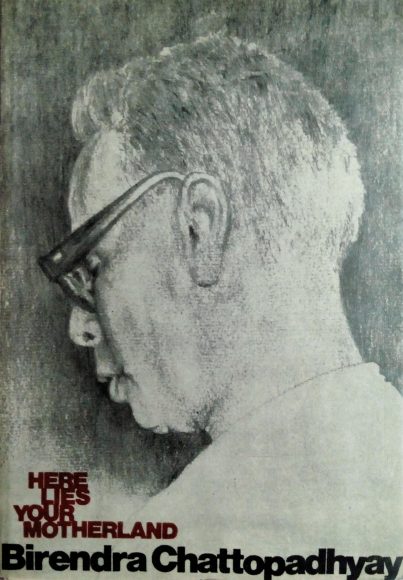
Cover picture from Nilanjan Dutta’s original book of translations. The sketch is by the late Debangshu Sengupta.
Since human beings are eminently perishable, they seem to have an obsession for permanence. It is normal for people to yearn for what they do not possess or do not have a chance to possess in their lifetimes. But this holds good only for external things. It is another matter when they realize that they are already in possession of something that is indestructible, something that “weapons cannot tear, fire cannot burn” (Bhagavad Gita 2.23). That becomes a source of immense strength – the courage to endure the lows of life, and yet envision unattained heights. The realization of this inner strength is the recognition of the spirit. When the spirit takes over, all bodily pains recede.
The poems of Birendra Chattopadhyay (born in Dhaka, September 2, 1920; died in Calcutta, July 11, July 1985) celebrate this indomitable power of the human spirit. The decades over which his life as a poet spanned were marked by constant turmoil and transition in the society of Bengal. He was no mere observer, but one who identified himself with the forces that were consciously oriented towards bringing about a revolutionary change in society. Driven by this conviction, time and again Chattopadhyay broke the police cordon and suffered imprisonment. He wrote piercing poems and prose pieces that sprang from the pangs of a newly independent but partitioned country in the late 1940s and ’50s, and the tumult of the people’s movements in the 1960s. In the 1970s, his poems decried the massacre of radical youths in the strongest of idiom, and in the same decade, he raised a rare voice of protest against the Indian Emergency among the older intellectuals of Calcutta and campaigned wholeheartedly for the release of political prisoners. His towering presence was a regular feature and a source of assurance for the young protesters in every rally, including the “risky” ones. In the 1980s, his poetry raged against the acts of betrayal of the Left establishment (then ruling the eastern Indian state of West Bengal) but unlike many others, he did not lose faith in the ideology of the Left movement.
No wonder Birendra Chattopadhyay became a rallying point for a host of young poets as well as prosaic “activists” like me. The blend of revolutionary passion and romantic imagination made his poetry sublime. Throughout his literary life, he relentlessly inspired and encouraged us to keep our spirit awake and unblemished without falling into the trap of spirituality. “Hold your head high, even in hell,” he told us. Meanwhile, the poet became inflicted with life-threatening cancer and embarked upon a different battle, and it was during this phase that his poems found the most intense expression of death-defying spirit.
Shortly after Chattopadhyay left us, I translated a few of his poems into English at the request of revolutionary Telugu poets K.V. Ramanna Reddy and Varavara Rao. Later I translated some more, which were compiled in a book, Here Lies Your Motherland, in December 1985. Here are revised translations of some of the poems written from his deathbed.
Young Poets
Words have left me long ago
And yet, I want to say something more
Young poets! Come forward!
The world has not run out of words
By the sound of your footsteps
I would know the road I must tread.
Sad People
People who are sad
For human beings or a flower
They know life from hunger
And tell Death: ‘We will never recognize you.
There’s no place for you on our earth.’
If they see a dead bird on the ground
Around it they sing songs of rebirth
There’s sadness in it; but without sorrow
Can one take love to the heart?
You, Death
(To Dr. Bhoomen Guharay)
It is not true that Death doesn’t wait for anyone.
Often he has to.
He knows, victory will be his in the end. But
some small defeats, to the indomitable human will
He must suffer. Humans know they are not immortal,
but still they write poems, sing, draw pictures,
And then, Death sitting beside their bed,
begins to lose his patience and courage.
Death, you must learn to be patient and
give us time to get prepared.
Let us feel that the touch of your cold hand
is not a frightening story.
On that day keeping you in front
We shall start our journey not destined.
Then we’ll tell our dear ones frank and clear
‘He is insurmountable, but we haven’t lost the game either.’
To the Young Poets
From behind the clouds your faces are becoming clearer
I am happy. I can see some real human faces
and touch them.
Teach us to be fearless, so that we
can cross Death now blocking our way in front.
A Few Lines for B.C.
Why does he write his name
On stone
When the sun goes down?
The stone is washed away by the river
The water
Recedes, he knew it
He knows…
A Poem for My Daughter
Flowers do not bloom throughout the year
Birds do not sing throughout the year.
Still, dream remains. The people we know
Stay near.
Even if flowers do not, human beings remain.







